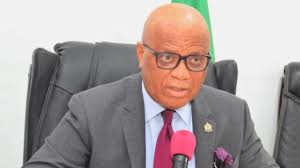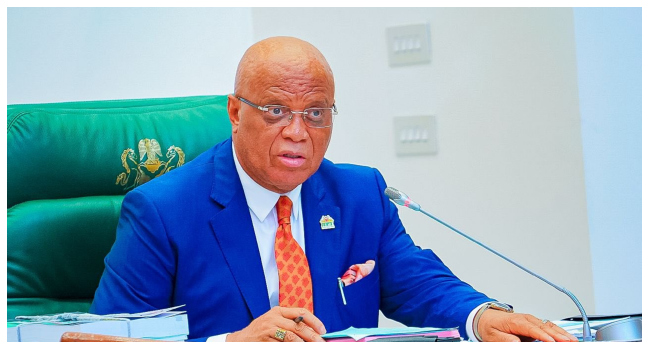In a significant move aimed at resolving the ongoing impasse concerning the amended Akwa Ibom State Traditional Rulers’ Law 2023, Governor Pastor Umo Eno has received the comprehensive report of the committee established to address these issues. The report was handed over at the Government House in Uyo, marking a crucial step towards finding lasting solutions barely two months after the governor constituted the 7-man committee.
Headed by the Paramount Ruler of Eket, Edidem E. C. D. Abia, the committee was tasked with addressing concerns stemming from the implementation of the Akwa Ibom State Traditional Rulers’ Law 2023. This law notably renamed the “Akwa Ibom State Traditional Rulers’ Council” to “The Supreme Council of Traditional Rulers,” designating the Okuibom Ibibio as the life President.
Governor Eno, upon receiving the report, reiterated his dedication to thoroughly review the committee’s recommendations. He assured all stakeholders of his commitment to draft a bill that would genuinely reflect the interests and wishes of all parties involved. This draft bill, he promised, would be forwarded to the State House of Assembly for necessary legislative action.
Expressing gratitude to the committee members for their service, Governor Eno emphasized the importance of their work in maintaining peace and harmony within the state. He expressed confidence that the report addressed critical issues such as the rotation of the highest traditional stool, the tenure of traditional headship, and the roles of chairman and president-general of the Traditional Rulers’ Council.
In his remarks, Edidem Abia, the committee chairman, commended Governor Eno for his proactive approach in setting up the committee. He praised the governor as a true leader committed to peace and unity in Akwa Ibom State. According to Edidem Abia, the committee took considerable time to engage with relevant stakeholders to ensure that the report truly represented the interests of all concerned.
Highlighting the challenges that arose from the earlier amended law, Edidem Abia attributed the disagreements to inadequate consultation. He emphasized that the committee had extensively consulted with key stakeholders, including memoranda from Ifim Ibom Ibibio and the Paramount Rulers of Annang, Oro, and Obolo ethnic groups. These consultations underscored the necessity of a rotational approach in the leadership of the highest traditional stool, a recommendation aimed at promoting peace and unity within the state.
The committee, formed on April 16, 2024, included the Paramount Ruler of Eket LGA, His Royal Majesty, Edidem Abia as Chairman, along with six other paramount rulers as members. Their assignment was to mediate and find a consensus on the contentious issues raised by the amended traditional rulers’ law.
The presentation of the report was a well-attended event, witnessed by notable dignitaries including the Speaker of the State House of Assembly, Elder Udeme Otong, the Secretary to the State Government, Prince Enobong Uwah, the State’s Attorney General and Commissioner for Justice, Uko Udom SAN, and a former Attorney General of the state, Barr. Ekpenyong Ntekim, who served as counsel to a section of the traditional rulers.

Governor Eno’s initiative to resolve the disputes surrounding the amended law demonstrates his administration’s commitment to inclusive governance and the promotion of unity. By prioritizing dialogue and consultation, he aims to ensure that the leadership of traditional institutions in Akwa Ibom State is reflective of the diverse interests and aspirations of its people.
As the state moves forward, the implementation of the committee’s recommendations is expected to foster a more harmonious relationship among traditional rulers and the communities they serve. Governor Eno’s approach sets a precedent for addressing complex issues through collaboration and mutual respect, paving the way for sustained peace and development in Akwa Ibom State.
This development is a testament to the governor’s resolve to uphold traditional values while embracing modern governance practices. The outcome of this process will likely strengthen the traditional institutions, ensuring they continue to play a pivotal role in the cultural and social fabric of Akwa Ibom State. As the draft bill makes its way to the State House of Assembly, all eyes will be on the legislative process to see how these pivotal changes will be enacted into law, ultimately shaping the future of traditional governance in the state.




